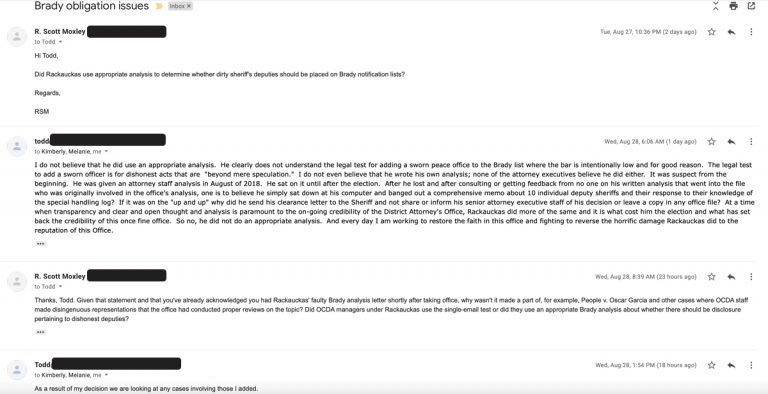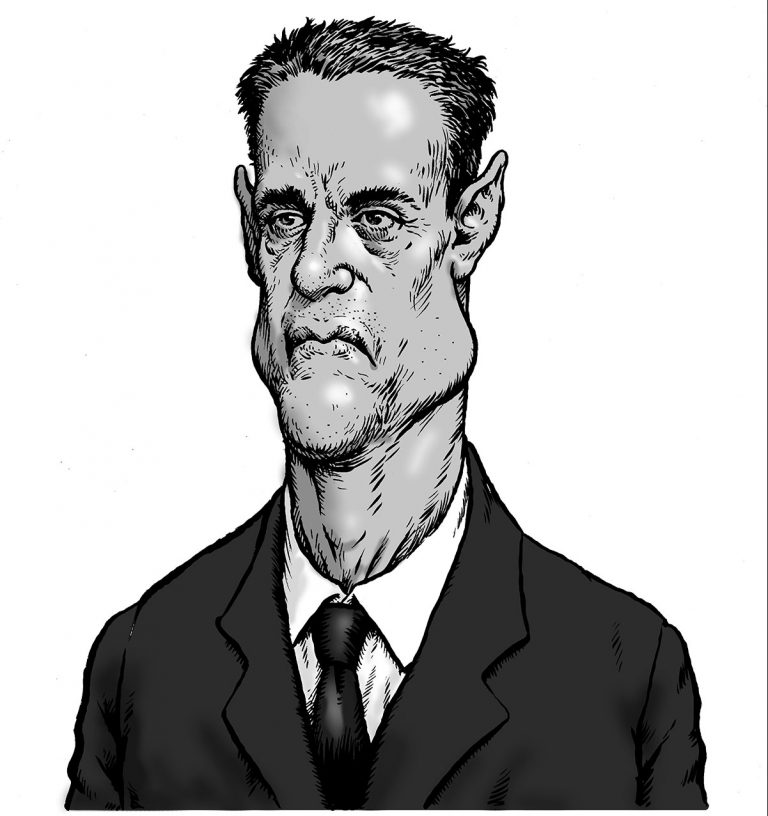New Orange County DA Concedes Evidence Disclosure Disaster
Orange County prosecutors have called Assistant Public Defender Scott Sanders crazy, paranoid, unhinged and a conspiracy theorist, leading the local daily newspaper several years ago to label him “polarizing.” Thin-skinned defense attorneys might have pouted or seethed, but the terms make Sanders chuckle. In addition to being a supreme multitasker, he possesses a self-deprecating sense of humor.
But there’s one undeniable truth that emerged from the infamous jailhouse-informant scandal he exposed: Nobody creates more angst and anger inside 401, shorthand for the Santa Ana office building that houses the Orange County district attorney’s office (OCDA), than him.
It’s understandable that former DA Tony Rackauckas and his executive team would loathe Sanders. His revelations led to their historic and embarrassing recusal from a death-penalty case stemming from the county’sworst mass shooting. His work also upended at least 20 felony cases tainted by law-enforcement corruption during Rackauckas’ final three years in office.
Freshman DA Todd Spitzer won last November by campaigning on a reform platform that targeted his predecessor’s ethical woes. Yet, when Spitzer took over eight months ago, he kept in power many of the Rackauckas aides who were directly involved in the cheating or tried to cover it up. He has also maintained OCDA’s courthouse campaign against Sanders.
Instead of distancing itself from badged crooks, the new administration has been, like the previous one, working to thwart the public defender’s ability to represent his clients as well as expose additional scandals.
If anything, those efforts have become more intense and bizarre.
For example, in January, after Spitzer was sworn in, Deputy DA Andrew Bugman defended the hiding of impeachment material pertaining to snitch-scandal-tainted deputies at least 146 times. The upshot is that officers involved in that cheating have been taking the witness stand, claiming to tell the truth about arrests and relying on the credibility that comes with their uniforms. But because of the government’s refusal to surrender records, defense lawyers’ ability to challenge their honesty is hamstrung. To Sanders, OCDA has pretended to meet its discovery obligations.
But Bugman threw a series of shots back: Sanders could only “speculate”that the impeachment records would be helpful; that he was conducting a legally irrelevant “fishing expedition”; and that his discovery demands weren’t to benefit his client in People v. Oscar Garcia, but rather were evidence he’d betrayed attorney-client trust in hopes of carrying out his “personal agenda.”
Bugman didn’t exactly define that agenda, but he finds it suspicious, if not alarming, that Sanders chose to represent indigent clients in West Court near Little Saigon. He claims it is “telling” that the public defender took such work in cases involving former Special Handling Unit deputies who ran illegal operations and either hid exculpatory records or maintained a code of silence about the existence of such evidence. The prosecutor also implied that Sanders had cheated Garcia, noting this defendant “is Spanish speaking” but apparently unaware the public defender is fluent in Spanish.
Sanders complained to Superior Court Judge James Rogan that OCDA was faking its Brady obligations to surrender exculpatory evidence as proved by the aforementioned 146 cases. In response, Bugman assured the judge that his office was honoring its discovery duties. Rogan, a former prosecutor, then agreed to block the public defender’s related subpoena—but issued a caution. “My assumption and my expectation of Mr. Bugman would be that if indeed following this hearing, he found that [his assertions were] anything other than what he represented to the court, he would have an immediate obligation to report that to the court and to [defense] counsel,” the judge stated.
But Rogan didn’t know and Bugman didn’t share the contents of a bombshell December 2018 OCDA letter to then-Sheriff Sandra Hutchens. The correspondence from Rackauckas outlined what can accurately be called a ruse prosecutors concocted. Two years earlier, the sheriff’s department had asked deputies if they personally possessed Special Handling Unit or Classification Unit records. When they answered that sham question in the negative, Rackauckas claimed that was all the proof he needed to keep the deputies off Brady disclosure lists for exhibiting dishonesty, regardless of any offending conduct.
“I understand the importance of this decision and its impact on the criminal-justice system, the rule of law, future cases and the lives of the [deputies] involved,” wrote Rackauckas, whom the California Court of Appeal blasted in 2016 for habitually protecting dirty cops who’d helped his office wins trials.
Release of that secret letter months after Rogan’s ruling in favor of OCDA left Sanders fuming. “The DA’s office knew it had been hit hard by our allegations that they were not performing meaningful Brady analysis on any of the deputies involved in the snitch scandal,” he said. “Yet Spitzer and Bugman stayed silent until after I lost the motion. That Rackauckas letter proves we were 100 percent right. They created a phony email test as a coverup that would allow them to claim, ‘We did Brady’ and, ‘There’s no material you should get.’ None of this passes constitutional muster.”
Events turned downright nutty this month in Sanders’ People v. Mohamed Sayem, a case in which deputies last year pummeled the unarmed defendant after catching him intoxicated and sleeping in his parked vehicle. OCDA won a protective order in January from Superior Court Judge Kevin Haskins, a former prosecutor, that sealed a 2009 PowerPoint presentation the agency used to prosecute Christopher Hibbs, a deputy who’d fired his Taser multiple times at a handcuffed, restrained and seated suspect. With a deadlocked vote, a Fullerton jury refused to hold Hibbs accountable; he won promotion to sergeant and found himself the ranking officer at the Sayem scene, where deputies worked to fashion a justification for that beating.
Deputy DA Matt Plunkett told Haskins there “is a compelling governmental interest” to keep the PowerPoint away from public consumption, a move he claimed would protect the integrity of the criminal-justice system by not undermining Hibbs’ credibility. Plunkett also accused Sanders of violating the order by conducting a Google search and finding the presentation available online. The PowerPoint must remain “confidential,” Plunkett argued.
But the PowerPoint in question has been in my possession for a decade. It was given to me by the OCDA. There’s even a photograph on Google showing Rackauckas standing in front of the presentation about Hibbs’ excessive use of force.
My May 14, 2009, column stated: “[A ranking DA] spent 45 minutes (he could have spent twice as long) meticulously detailing in a PowerPoint presentation how deputies had either lied under oath during the trial or developed sudden, severe cases of amnesia about what they’d told the grand jury that indicted Hibbs.”
Now, ironically, Spitzer is working to protect that deputy.
On the other hand, the DA is finally admitting that Rackauckas and the OCDA office used a test for determining whether to disclose evidence of deputy misconduct which was inconsistent with Brady.
“I do not believe that he used an appropriate analysis,” the DA told OC Weekly. “He clearly does not understand the legal test for adding a sworn peace officer to the Brady list where the bar is intentionally low and for good reason. . . . I am working to restore the faith in this office and fighting to reverse the horrific damage Rackauckas did to our reputation.”

Spitzer, however, declined to answer two follow-up questions: Given your statement and that you’ve acknowledged you had Rackauckas’ faulty Brady analysis letter shortly after taking office, why wasn’t it made a part of, for example, in Garcia, and other cases where OCDA staff made disingenuous representations that the office had conducted proper reviews on the topic? And, Did OCDA managers under Rackauckas use the single-email test or did they use an appropriate Brady analysis about whether there should be disclosure pertaining to dishonest deputies?
“It’s an incredible moment,” reacted Sanders. “Spitzer admitted both that the OCDA didn’t honor its discovery obligations for years when it came to jail deputies and that it also created a phony test designed to withhold evidence. Hundreds of cases need real review now. Those prosecutors involved in the misconduct should be held accountable and Spitzer’s failure to answer your second set of questions also speaks volumes.”
The DA has placed four deputies’ names on the Brady list, but the public defender argues the move was almost meaningless because two of them have left the department and one has been on administrative leave for years.
It’s obvious Spitzer faces unyielding forces—inside and outside of his office—that are at odds with the public trust. There’s no doubt he wants to win the backing of the dirty-deputy protecting Association of Orange County Deputy Sheriffs in the next election. But to manage OCDA wisely, he has a duty to display genuine independence from that union and the sheriff’s department when it comes to officer corruption. So far—as exhibited by the Brady disaster plus the maneuvers of Bugman and Plunkett—he’s failing.
CNN-featured investigative reporter R. Scott Moxley has won Journalist of the Year honors at the Los Angeles Press Club; been named Distinguished Journalist of the Year by the LA Society of Professional Journalists; obtained one of the last exclusive prison interviews with Charles Manson disciple Susan Atkins; won inclusion in Jeffrey Toobin’s The Best American Crime Reporting for his coverage of a white supremacist’s senseless murder of a beloved Vietnamese refugee; launched multi-year probes that resulted in the FBI arrests and convictions of the top three ranking members of the Orange County Sheriff’s Department; and gained praise from New York Times Magazine writers for his “herculean job” exposing entrenched Southern California law enforcement corruption.
CITED FROM https://www.ocweekly.com/todd-spitzer-corruption-deputies/


